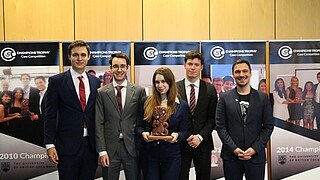All three of the RSM cases are used for teaching business with an eye on the future, and feature innovation and strategy of sustainable business. “Being at the top of this ranking proves yet again that RSM cases are appreciated and well used by teachers and lecturers around the world,” said Dr Bas Koene, director of RSM’s Case Development Centre.
Claiming two of The Case Centre’s top spots in the ten most popular free cases were RSM’s Flying parts: best practices in organisational innovation following implementation of new technologies and Interface: creating a climate fit for life through carpet tiles. Winning titles of the free cases are based on the number of downloads across all subject areas.
Free cases for social impact
Tao Yue, managing editor at RSM’s Case Development Centre said: “RSM is proud to have such a strong free case collection. We carefully select our free cases to make them open access, and they all deal with topics about sustainability or social impact. Most cases come in sets and are the outcome of some larger projects, such as the SDG project, and EU projects like QuInnE, ENABLE and SELIS.”
View the descriptions and the complete free collection here.
Global bestsellers
The Case Centre’s list of best-selling cases is made up of the top 15 titles in ten major subject areas, based on unit sales during the preceding calendar year. RSM’s case Fairphone: organising for sustained social impact met these criteria and placed in the 2022 top 15 of the entrepreneurship category.
Business change towards sustainability
All three RSM CDC cases are connected by the common theme of sustainability and social impact. The cases show how these issues permeate many very different business situations. The Flying Parts case addresses the impact of technological innovation on job quality and the need for supporting organizational innovation. The Fairphone case the creative combination of social movement activism and social entrepreneurship. Dr Steve Kennedy, associate professor in RSM’s Department of Business-Society Management explains the value of the Interface case, “It enables students to dive into corporate strategy for net positive climate action. Climate change strategy is itself highly detailed and requires close attention, which these cases help to provide.”
“Global turmoil actually sharpens the focus on the need to change business-as-usual towards sustainability,” explains Dr Kennedy. “Studies have shown a close link between firms with high sustainability performance and the ability to withstand shocks and disturbances, and survive in the long term. Effective climate change strategies can help mitigate costs and risks, while offering excellent opportunities for value creation. Global turmoil makes these risks highly evident to firms, giving a window into a potential future to be avoided and strengthening business cases for action.”
RSM’s large free case collection can be accessed on The Case Centre platform by anyone who is interested. They include cases about the UN’s Sustainable Development Goals (SDGs), and the adoption of innovative business models. For more information, contact the team at the Case Development Centre.




